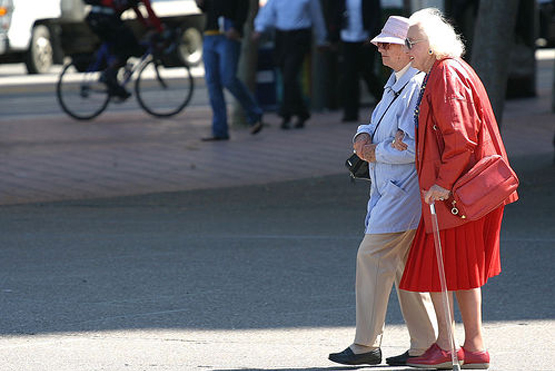Keeping in Step
$5.8 million grant for BU, BMC will help elderly maintain mobility, independence

Muscle biologists have described the problem, epidemiologists have emphasized its magnitude, physical therapists have worked to keep pace with it, physicians and researchers routinely see its effect. But no one has yet developed a drug to treat frailty in the elderly.
“Everyone recognizes that as people get older physical function declines,” says Shalender Bhasin, chief of endocrinology, diabetes, and nutrition at Boston University Medical Center (BUMC) and a professor of medicine at the School of Medicine. “But despite all our knowledge of how our bodies break down over time, we have no approved medical therapies to specifically address it.”
 Bhasin (right) is not after a magic bullet or a fountain of youth. Rather, he and a large interdisciplinary team of researchers from several institutions are engaged in a new effort to find ways to enhance and restore mobility and independence in the elderly. This past September, BUMC received $5.8 million over five years from the National Institute on Aging to fund the Boston Claude D. Pepper Older Americans Independence Center, an interdisciplinary research effort focused on pharmacological therapies that improve physical functioning in the elderly. “We have always had many research targets and lots of data,” says Bhasin, the grant’s principal investigator. “The idea now is to collaborate to translate that work into therapies people can use.”
Bhasin (right) is not after a magic bullet or a fountain of youth. Rather, he and a large interdisciplinary team of researchers from several institutions are engaged in a new effort to find ways to enhance and restore mobility and independence in the elderly. This past September, BUMC received $5.8 million over five years from the National Institute on Aging to fund the Boston Claude D. Pepper Older Americans Independence Center, an interdisciplinary research effort focused on pharmacological therapies that improve physical functioning in the elderly. “We have always had many research targets and lots of data,” says Bhasin, the grant’s principal investigator. “The idea now is to collaborate to translate that work into therapies people can use.”
Named for the late U.S. senator from Florida who served in Congress from 1936 until his death in 1989, the Claude D. Pepper Center honors a man who devoted his life to public service and advocacy for the health and well-being of older adults; an avid supporter of President Franklin D. Roosevelt, Pepper urged the adoption of national health insurance and supported the creation of Social Security, a minimum wage, and medical assistance for the elderly.
Bhasin’s group was chosen from among 15 across the country competing for the grant, and the award, says Bhasin, bolsters Boston’s status as a hub of research on the elderly. The Boston chapter is one of only 11 Pepper Centers in the country.
While its name suggests one centrally located building, the Pepper Center is actually housed in four core facilities across the city: an administration and leadership core at BUMC; a function assessment and exercise lab at both BUMC and Tufts University; a systems biology lab at the School of Engineering; and a muscle stem-cell lab at the Joslin Diabetes Center. Each lab is home to a host of researchers engaged in a variety of projects: BUMC researchers are currently focusing on testosterone and similar hormones in developing drugs that will target muscle proteins to increase muscle mass and maintain mobility. In addition, researchers and clinicians from several disciplines and institutions are addressing other ailments, such as osteoporosis, hip fractures, and type one diabetes.
Over the next five years, Bhasin and his fellow researchers will explore several types of therapies, including efforts to prolong and restore older patients’ ability to walk. Walking speed, Bhasin explains, is an accurate predictor of people’s general health and has a huge impact on their quality of life. “It is often the key to maintaining independence,” he says. “Once mobility is gone, things can spiral downward.”
At the School of Public Health, Alan Jette, the director of the Health and Disability Research Institute, and a professor of health policy and management, is collaborating with several researchers on a new standardized method of assessing function and disability in older patients. Much like today’s standardized education exams, he explains, these tests are administered on computers, and generate new types of questions as the test proceeds, based on individual patients’ previous answers. “This allows you to complete the assessment more quickly,” he says, “and compare your results.” In the coming months, his team will be meeting with geriatric clinicians to refine the diagnostic, as well as with groups of older patients to discuss the physical issues they face.
Great research, however, requires great researchers, and Pepper Center members are equally dedicated to training the next generation of professionals. Rebecca Silliman, the chief of geriatrics at BUMC, and a MED professor of medicine and epidemiology, is the director of the Pepper Center’s Research and Development Core, a unit devoted to cultivating and supporting early-career investigators in aging research. Currently, four trainees — a geriatrician, a physical therapist, a rheumatologist, and an endocrinologist — participate in the program. After submitting proposals, the trainees were selected and assigned mentors, awarded funding for research projects, and in the coming months will participate in a series of teaching seminars aimed at developing skills in preparing manuscripts, grant proposals, and presentations.
“If we’re going to enhance the workforce in elderly research,” says Silliman, “we need to train people from many different disciplines to focus on the same problems. Only when they ask the same questions — and share their different answers — will we make great progress.”
Comments & Discussion
Boston University moderates comments to facilitate an informed, substantive, civil conversation. Abusive, profane, self-promotional, misleading, incoherent or off-topic comments will be rejected. Moderators are staffed during regular business hours (EST) and can only accept comments written in English. Statistics or facts must include a citation or a link to the citation.